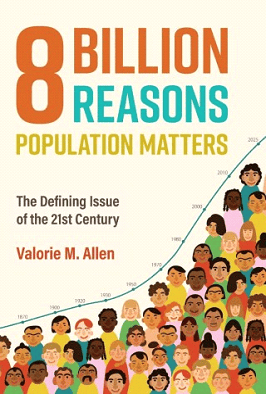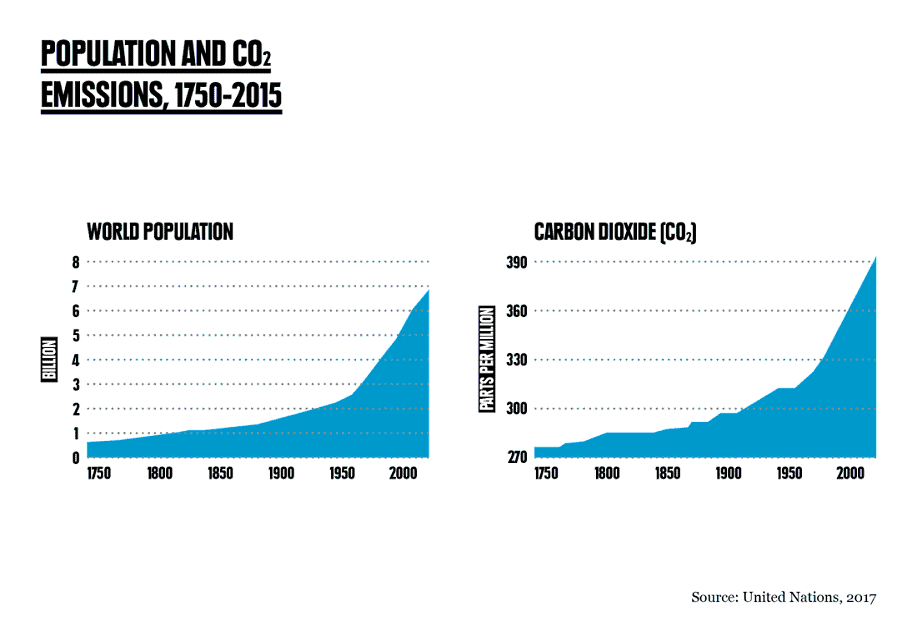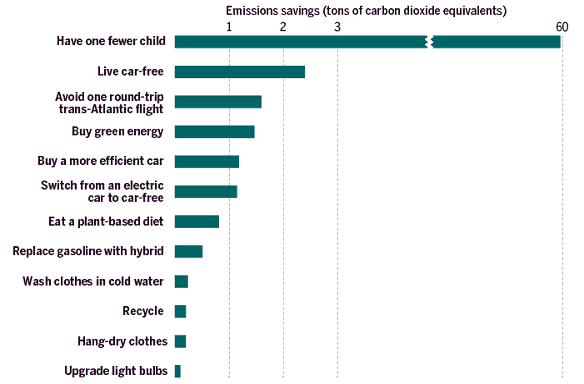On 15 November 2022, Earth’s human population will pass 8 Billion, according to estimates by the United Nations. This sobering milestone should galvanize us to redouble our efforts to minimize further growth.
I have found myself checking out the population counter on my website more and more often as it approaches the staggering number of 8 BILLION predicted for November 15, 2022. It is a surreal day, one that I never thought I would see, or wanted to.
Yikes, how do I feel about this? I have mixed feelings – apprehension of course, a sense of panic and dread, but then a sense of urgency and purpose takes over. This historic event makes me determined to do everything in my power to make this the last billion that is added to our small, crowded planet.
At times like this I look to some of my heroes for inspiration and the courage to continue fighting for a sustainable population agenda. One such hero had this to say:
“We can’t go on like this. We can’t push human population growth under the carpet. I would encourage every single conservation organization, every single government organization to consider the absurdity of unlimited economic development on a planet of finite natural resources.”
– Jane Goodall
This message needs to reach as many people as possible. That’s why I wrote the book, Eight Billion Reasons Population Matters . It’s my attempt to make the facts and issues accessible to a wider audience, and to ensure that the focus is on real world solutions.

Never before have so many people been so misinformed about something as important and urgent as population. After decades of dire warnings and scientific findings, it is clear that humanity must finally confront the myths and taboos that are holding us back from addressing our population crisis. My book is a bold effort to demystify the population puzzle and steer us toward a more intentional and promising future, rather than allow human nature to blindly forge a path forward that leaves no space for a healthful existence.
We are hearing a lot about climate change on the news lately, yet not a whisper about population. Do you think that this eight billion milestone will help us connect the dots?

Credit: Population Matters
What are some of the indicators of overpopulation?
- World population is increasing by 80 million people per year. It took 200,000 years to reach our first billion around 1800 – it took just 12 years to add our last billion. Experts tell us that a sustainable population level would be at most 3 billion , or in the range 0.5-5 billion .
- There are more human babies born each day – about 250,000 – than there are individuals left in all the great ape species.
- Humans and their farm animals now make up 96% of all mammalian biomass on Earth – other mammals make up only 4%.
- Plastic is expected to outweigh all fish in the ocean by 2050 if we do not change our ways.
- As global population increases, the cost of food for everyone increases and we are increasingly at risk from pandemics, stress related illness and climate disruption.
As people learn to recognize the impacts of overpopulation, the realization sets in that the long and good fights by environmental groups and world aid groups are all for naught as every gain is soon overwhelmed by the pressures of more growth. But this must be a call to action, not despair. That’s why I prefer to focus on practical solutions and the good-news stories that set an example for others to follow.

Credit: Science magazine (graphic), Wynes and Nicholas (data)
What can world leaders do to help?
Unfortunately, many world leaders have repeatedly failed to meet their commitments for family planning made at UN conferences, and the UN has made little effort to ensure compliance. Rather than pointing out the connection between population increase and growing hunger or the “ staggering backsliding across women’s, children’s and adolescents’ health ” and championing efforts for more family planning, the UN has belittled population concerns and presented the 8 Billion milestone in a celebratory tone:
“Reaching a global population of eight billion is a numerical landmark, but our focus must always be on people,” said UN Secretary-General António Guterres. “In the world we strive to build, 8 billion people means 8 billion opportunities to live dignified and fulfilled lives.”
It especially saddens me to hear the comment that “our focus must always be on people,” since it seems to me that is what our focus has exclusively been on. With this anthropocentric worldview, humans are put on a pedestal and animals and nature are reduced to nil. It is little wonder that other species are becoming extinct at such an alarming rate. In addition, I’m sure that the millions of people living in poverty wouldn’t view their lives as “dignified or fulfilled.”
Dr Natalia Kanem, the Executive Director of the United Nations Population Fund, warns that we must not engage in “population alarmism,” as our soaring population is “ not a cause for fear. ” Yet, if the mounting pressures of overpopulation are not a cause for fear, what is?
Overpopulation is the driving force behind most of our critical world issues, such as poverty, climate change, water shortages, extinction of species, human trafficking, increasing pandemics, loss of our old growth forests, etc. Therefore, would it not make sense that increasing our population would only worsen these problems?
Fortunately, there are governments in numerous countries, like Thailand and Costa Rica , that implemented very humane and successful family planning programs that set an example for the world.
Since over 40% of pregnancies globally are unintended, if governments were to take appropriate measures to prevent these unplanned pregnancies, this one act alone could advance our society into a state of degrowth. The good news is that the funding required for this project would only require diverting a few months of military spending towards this far more beneficial endeavor.
The task before our leaders is to recognize the costs of inaction if they continue to ignore their responsibility regarding overpopulation, and to take effective and timely measures to achieve a sustainable population to benefit the common good. One step towards realizing this goal would be to adopt an economic system that took environmental impacts into consideration. For example, replacing the Gross Domestic Product with the Genuine Progress Indicator would emphasize what we sacrifice for the sake of growth.
What can you do to help?
If you are reading this blog, I’m sure you are wondering what you can do to make things better for the next generation. The good news is that there are a lot of ways to help.
- Start a conversation – at school, work, the dinner table, and with social media.
- Have smaller families. Did you know that having one less child will save 60 tons of CO2 emissions a year – 25 times the emissions avoided by living car-free?
- Demand a calm, fact-based dialogue around population growth from our political leaders.
- Support population and reproductive health groups.
- Since 40% of pregnancies are unintended globally, demand that your government provide access to family planning education and safe and effective contraception options.
- Read my book for many more solutions and success stories.
“Child-first family planning provides a clear human rights-based solution and path forward. It’s sustainable and equitable, and reflected in the worldwide trend towards smaller families that can invest more in each child and ensure a safer future.”
Clearly, living in a world of 8 billion is a wake-up call for all of us to step up and do our part to protect this jewel of a planet. So let me be the first to welcome all you readers out there in cyberspace to the zero-growth community. Together, let’s make it happen!

Valorie M. Allen is an award-winning Canadian conservationist, animal rights campaigner and author of the book Eight Billion Reasons Population Matters. Her website is www.populationinsync.net
Overpopulation Research Project Climate Change , ecological footprint , fertility , Governmental institutions , Population growth , Population taboo , Solutions , Sustainable population

